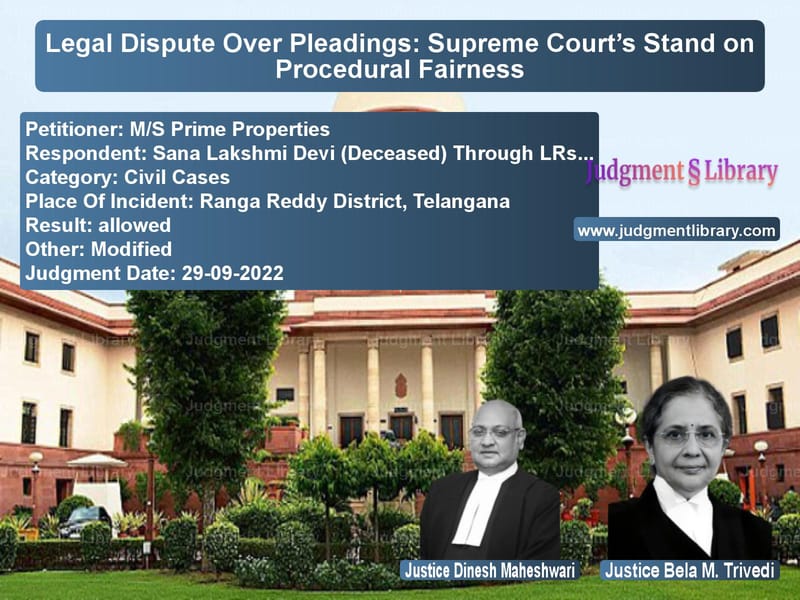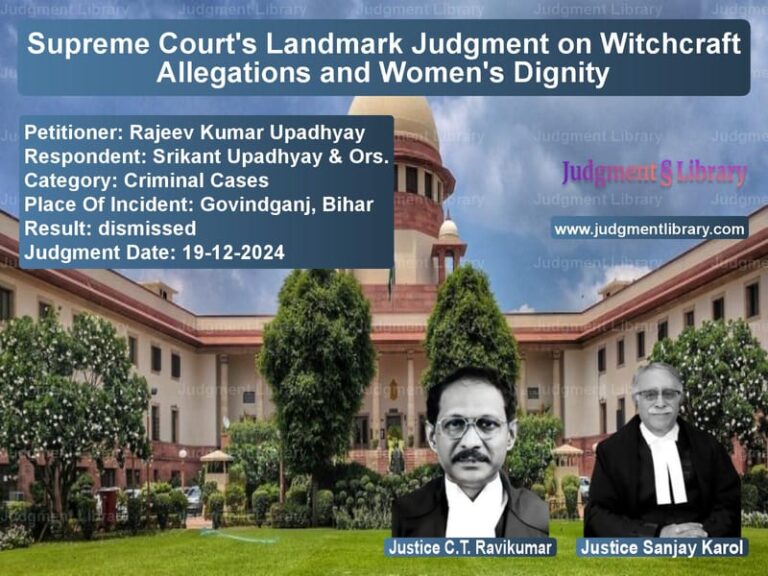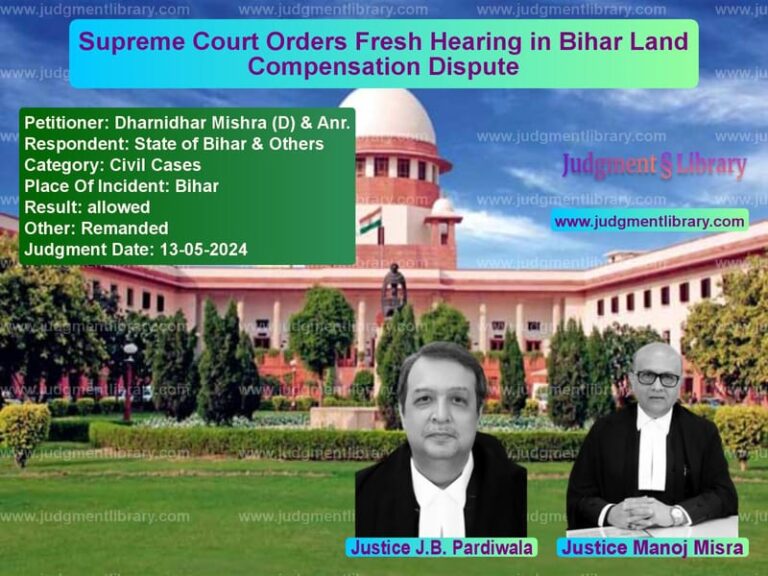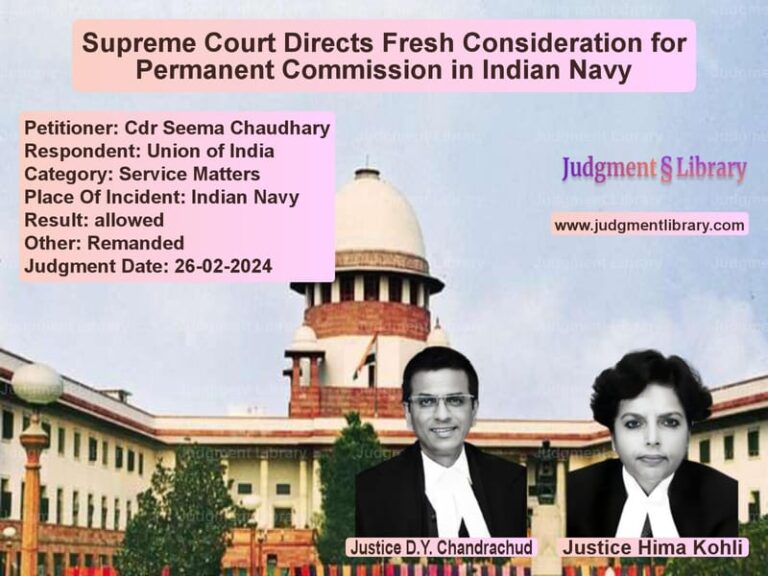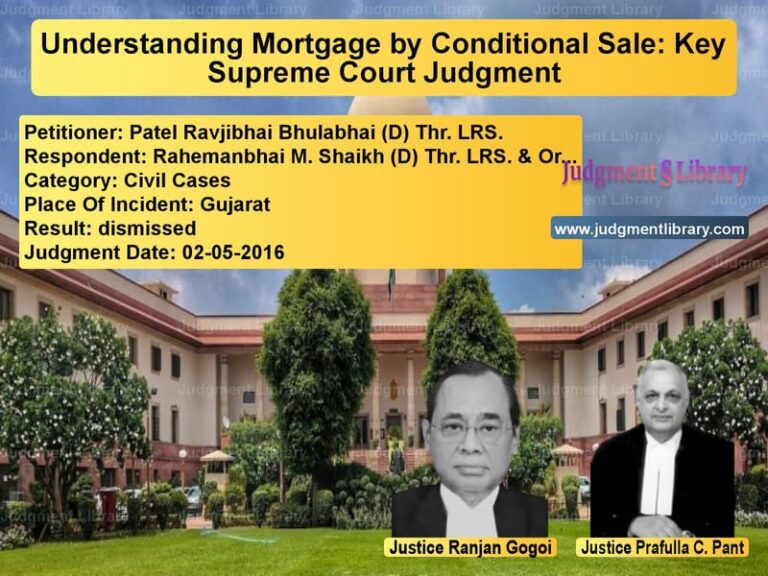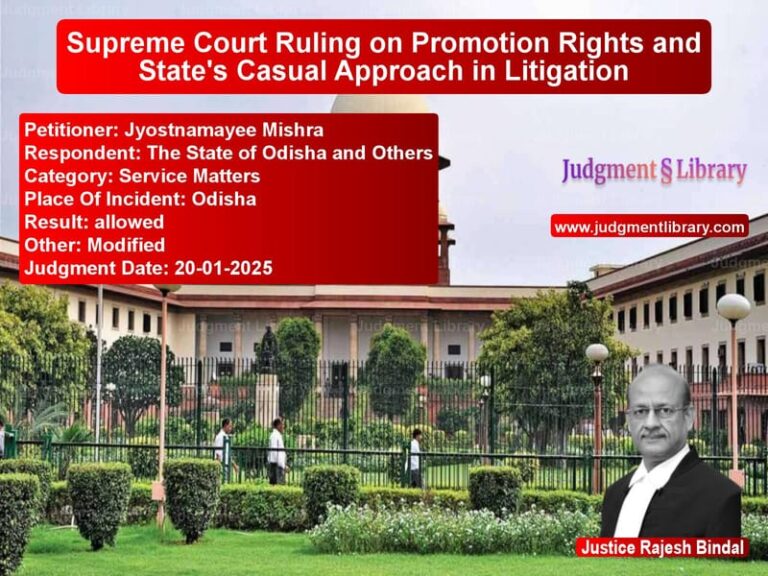Legal Dispute Over Pleadings: Supreme Court’s Stand on Procedural Fairness
The legal battle between M/S Prime Properties and the legal representatives of Sana Lakshmi Devi brings into focus an essential question of procedural fairness in civil litigation. The case revolved around the right to file a rejoinder and its impact on long-standing litigation. The Supreme Court’s decision highlighted the delicate balance between procedural discipline and the need for fair adjudication.
Background of the Case
The litigation originated in 2001 when M/S Prime Properties, the appellant, filed a civil suit in the Court of I Additional Senior Civil Judge, Ranga Reddy District, Telangana, seeking cancellation of a sale deed executed in 1996 concerning land situated in Kukatpally Village, Balanagar Mandal. Alongside this, three other similar suits were filed regarding other parcels of land in the same area.
Over the years, the case underwent multiple procedural developments, including amendments to the plaint and the addition of new parties. The issues in the suit were initially framed in 2005, but due to non-prosecution, the suits were dismissed in 2008. However, they were later restored in 2011. The respondents, who had acquired interest in the disputed land, sought impleadment as parties, which was eventually allowed by the High Court in 2019, a decision upheld by the Supreme Court.
Arguments by the Petitioner (M/S Prime Properties)
The petitioner’s primary contentions included:
- The right to file a rejoinder should be permitted to respond to new points raised in the written statements of the newly impleaded respondents.
- The trial court had wrongly dismissed their application for filing a rejoinder based on a mistaken assumption that the proposed rejoinder had not been filed.
- Since the rejoinder had been filed before the pronouncement of the trial court’s order, the review application was justified to correct the apparent mistake.
- The High Court had erred in interfering with the trial court’s decision to review and allow the rejoinder.
Arguments by the Respondents
The respondents strongly opposed the petitioner’s claims, arguing that:
- The rejoinder was an attempt to introduce an entirely new case rather than merely responding to the written statements.
- The High Court correctly found that allowing a rejoinder at this stage would unduly prolong litigation.
- The petitioner had already delayed the case significantly since the original suit was filed in 2001, and multiple amendments had already been allowed.
- The Supreme Court had previously ordered the trial court to expedite the case, and allowing further rejoinders would contradict this directive.
Supreme Court’s Analysis
The Supreme Court, led by Justice Dinesh Maheshwari and Justice Bela M. Trivedi, critically examined the procedural aspects of the case. It observed that:
- While procedural rules are essential for maintaining discipline in litigation, they should not be applied in a manner that denies a fair opportunity to a litigant.
- The trial court initially dismissed the application for filing a rejoinder based on an incorrect assumption that the rejoinder had not been filed.
- The review order issued by the trial court was valid, as it merely corrected a procedural error and did not alter substantive rights.
- However, the Supreme Court also acknowledged the respondents’ concerns about potential delays and the introduction of new issues through the rejoinder.
Final Judgment and Directions
The Supreme Court reached a balanced conclusion by:
- Setting aside the High Court’s order and restoring the trial court’s decision to accept the rejoinder.
- Allowing the respondents to file a sur-rejoinder, but only in response to new facts introduced in the rejoinder.
- Reiterating its earlier directive that the trial should be given priority and concluded at the earliest, preferably before March 31, 2023.
- Clarifying that no additional issues needed to be framed in light of the rejoinder.
Conclusion
The Supreme Court’s ruling in this case underscores the importance of procedural fairness while ensuring that litigation does not become unnecessarily prolonged. By allowing the rejoinder and simultaneously granting the respondents the right to respond through a sur-rejoinder, the Court struck a balance between procedural discipline and substantive justice. The decision serves as a guiding precedent for future cases where procedural lapses could lead to unjust outcomes.
Read also: https://judgmentlibrary.com/adoption-dispute-and-property-rights-a-landmark-judgment/
Petitioner Name: M/S Prime Properties.Respondent Name: Sana Lakshmi Devi (Deceased) Through LRs & Ors..Judgment By: Justice Dinesh Maheshwari, Justice Bela M. Trivedi.Place Of Incident: Ranga Reddy District, Telangana.Judgment Date: 29-09-2022.
Don’t miss out on the full details! Download the complete judgment in PDF format below and gain valuable insights instantly!
Download Judgment: ms-prime-properties-vs-sana-lakshmi-devi-(d-supreme-court-of-india-judgment-dated-29-09-2022.pdf
Directly Download Judgment: Directly download this Judgment
See all petitions in Property Disputes
See all petitions in Contract Disputes
See all petitions in Judgment by Dinesh Maheshwari
See all petitions in Judgment by Bela M. Trivedi
See all petitions in allowed
See all petitions in Modified
See all petitions in supreme court of India judgments September 2022
See all petitions in 2022 judgments
See all posts in Civil Cases Category
See all allowed petitions in Civil Cases Category
See all Dismissed petitions in Civil Cases Category
See all partially allowed petitions in Civil Cases Category

